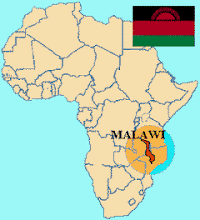L.G. Patron lives in the Dzaleka refugee camp in Malawi, a complex of shelters and dwellings that has housed refugees from several regional wars for many years. People in the camp and the surrounding area need guitars, so he’s been making them — using only a few basic tools and a lot of gumption.
Check this out:
From the Eastern part of the Democratic Republic of Congo, with an experience of 13 years in Guitar making. I do both Electric and box Guitar, I have started this job of making guitars when I was 21, now I’m 33 in D.R.C, My teacher is Mr. Mugomoka Byamungu Chiboza since 1999, but as of now I’m living in Malawi Dzaleka refugee camp because of the war in that country.
I’m really a good guitar maker according to my customers and all those who have ever seen or use my Guitars, but the big challenge that embarrasses me is lack of financial means.
I’m starting 15 box guitars and 12 Electric guitars, since I started here in Dzaleka camp in 2010 I have sold 7 Electric guitars here in Malawi and 8box guitars abroad. Some in South Africa, in Ireland, in England, in Canada and here in Malawi.
Malawi, of course, is another nation on the front lines of a rapidly changing climate:
Malawi is one of the most vulnerable countries to climate change and this has affected agriculture production which is the backbone of the country
The impacts of climate change in Malawi are being manifested in various ways such as intense rainfall, changing rainfall patterns, floods, droughts and prolonged dry spells.
Small-scale producers who provide more than half the world`s food supply and 70% of the food which feeds people in poor countries are already being impacted by climate change.
(snip)
Gogo Aisha from Salima District is 70 years old and looks after her 3 grandchildren. As the breadwinner of the family, she bemoans the change on climate over the years.
“In the past, the land was so fertile that we did not even need fertilizer. I used to harvest enough without applying fertilizer. Nowadays I have to apply fertilizer twice to harvest something. What has changed? The land is still the same but why am I not able to harvest enough anymore?
Apart from farming, gogo Aisha has no any other way of making money. Sometimes her family goes to bed without food.
The sociopolitical situation regarding the refugee camp is extremely complex.
Malawi accepted and is willingly hosting refugees. However, for years now, it struggles to accommodate their needs while keeping the Malawian citizens happy. As a poor nation, Malawi is politically and economically limited in the freedoms it “feels” it can allow refugees. UN High Commission for Refugees (UNHCR) guidelines request the host country allow refugees to pursue employment, but the guidelines are not enforceable because refugee camps are not sites of citizenship. Malawi has placed reservations on its obligations as host, such that refugees are not allowed freedom of movement and access to the Malawian economy through employment. Malawi’s restrictions have prevented many refugees from finding reliable employment, perpetuating rough and unbearable situations including the shortage of food which leads to malnutrition, lack of access to health care, extreme poverty and poor housing.
Malawi denies refugees the right of movement. Refugees are trapped in the camp and not allowed to explore the rest of the country. Many refugees have tried to go to cities to search for jobs but they are arrested, harassed, humiliated and returned to the camp. Many refugees have business backgrounds and are eager to start their own business in order to supplement the rations that the UN agency provides but their creativity is undermined and ignored.
Needless to say, the encroaching threats of climate change are going to exacerbate the complex and dangerous situation for Malawi’s citizen and refugee populations alike.



